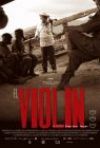
EL VIOLIN
Mexico, 2006, 98 minutes, Black and white.
Don Angel Tavira, Degoberto Gama, Girardo Taracena, Mario Garibaldi.
Directed by Francisco Vargas.
A first film that is both modest and ambitious.
It is modest in its small budget, use of local actors, filmed in black and white and telling a local Mexican story. It is ambitious in its cinema style and in the scope of exploration of themes.
The setting is a generalised peasant revolt against government oppression – that could stand for so many uprisings and liberation movements all over Latin America during the 20th century. The film opens with a grim sequence of military torture and comes back to it at the end.
The central characters are three generations of peasants who play music and sing in the cafes and marketplaces. However, they are also involved in the guerrilla warfare. The son is a leader. The old father, a riveting performance by Don Angel Tavira, a gnarled old man with a hand missing but who can play the violin beautifully. He also has other plans, using his violin as a decoy to save the peasants. The music-loving captain appreciates the music, but was not born yesterday…
The Violin takes its audiences (except for Latin Americans) into an unfamiliar world, a world of poverty, of long systematic oppression, of the taking up of arms in defence of a livelihood and justice, where peaceful methods and negotiation are impossible.
1. The impact of the film? A Mexican story? Told in a Mexican way?
2. The locations, the village, the cornfields, the mountains and the countryside? Authentic atmosphere? The decision to film in black and white? The impact of black and white photography?
3. The title, the importance of music, Don Plutarco and his playing the violin? His son and the guitar? The variety of songs? The captain and his love for music?
4. The prologue, the interrogation, the torture of the prisoners? The violence of the soldiers raping the women? The tone for the film - and for the peasant uprising against the oppressive
government and police?
5. The portrait of Don Plutarco, his age, his music, his love for his son, his grandson? Their journeying to the town? Playing for money in the cafes, in the streets? Their enjoying their
lunch? The irony of messages being passed to them? The information about the rebels? The son and his leadership amongst the rebels? Going out of the town to the camp? Don Plutarco and his plan, coming back to the village, charming the captain, playing the music? Riding the donkey? Leaving the town, the buried weapons and bullets? His burying the violin? His going into the countryside, being held up by the military? The boy collecting the arms, his giving the message to the group? His return, his finding his violin gone? Going back into the town, the captain wanting music - and the irony that the captain knew his plan, had taken the violin? Was sending troops to the town to take the men?
6. The presentation of the military, the torture? Oppressive? The captain and his love for music? The plan, going to the town, capturing the people, the hostages, the interrogation, shooting the
hostages? Bringing them to the town including Don Plutarco's son? Going back to the prologue and the torture scene?
7. The film not establishing what the peasant revolution was, not situating it time or history? As a symbol for the uprisings in Latin America?
8. The peasants, the Indian background, the hard lives? The burning of their homes and villages?
9. The grim ending? Don Plutarco and his son? But the hope with his grandson a young girl singing in the town and collecting
the money?